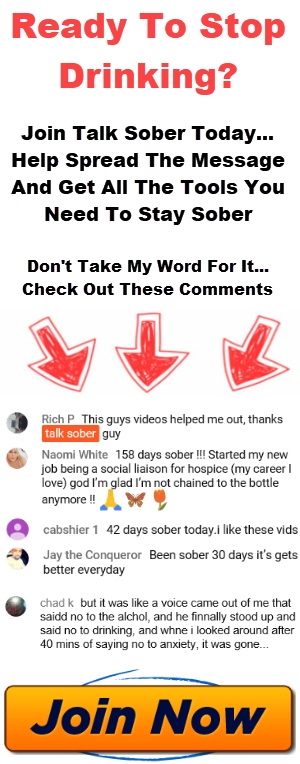How to Deal with Anxiety: Part 1
How To Deal With Anxiety – MUST WATCH if you suffer from anxiety and alcohol problems — Talk Sober at YouTube.com.
Today I want to talk to you about anxiety. I want to share with a story of mine and what I learned from it, so that you can start finding solutions to dealing with your own anxiety.
My Story
When I was first trying to get sober and dealing with anxiety, I went to see lots of therapists. I remember one therapist I had for about a year and a half. She had talked to me about my anxiety and what to do about it, and she tried to teach me mindfulness. She made little recordings of hypnosis stuff so that I could deal with it. And for me, going to therapy was an anxiety provoking thing. I didn’t want to be there, I didn’t want to dive into things, and with her being a hypnotist, I wasn’t sure what she was going to do.
One time I was sitting there, squirming in my seat. And she said, “I have a friend here that runs the local Buddhism meditation class.” And there I was, anxious and wanting results. All I wanted was for her to snap her fingers and just get me out of anxiety.

So she brought the guy in. And he had a stutter. Not that there’s anything wrong with stuttering—a lot of people deal with that issue, and I sympathize with them. But as someone with anxiety, I wanted answers fast, and I didn’t have the time in my brain. I hadn’t learned how to listen to people.
So this poor guy came in and tried to teach me about meditation, and relaxation, and mindfulness, and all this stuff. And with me being anxious, wiry, fast thinking all I could think about was, “Would you please tell me the secret? I don’t have time to sit here and listen to you jabber on about all these things.”
I just wanted an answer that would make me able to sit still for two seconds, but nothing seemed to work. I even went to another therapist after this one.
This guy specialized in addiction and recovery, so I signed up for his therapy. I went there, and the first time I met this guy, I was so anxious and I didn’t want to go. I wanted to cancel, but my wife told me I needed to go.
And so I did. Like any good alcoholic would do, I drank before going to therapy. I drank so much that I actually ended up turning the car and bursting a can of beer that sprayed all over my therapy notes.

(Disclaimer: Never drink and drive. I should have never done that. That’s not a good thing to do; don’t ever do it. Call uber, get someone to drive you, or just stay home. Cancel your appointment if you have to.)
So there I was, in my car, and I had all my notes. I was ready to go therapy totally not sober. I brought my notes in, stained with beer. If any of you are therapists, you know you’re not supposed to treat someone while they’re under the influence. But this guy treated me.
He said, “The key to anxiety is to go where you’re anxious, and keep going there, and keep going there. And the anxiety level will drop” It was called exposure therapy. The more that I was exposed to my anxiety, the more it would go down.
So here I was. I went to these faith-based recovery meetings, which weren’t working for me because they provoked all of the religion-related anxiety and issues I had growing up. And then there was this addiction counselor who just happened to be part of the big church that I was in, and all he wanted to do was talk about my past as a preacher, even though I was talking about drinking and anxiety and things like that. He was more interested in what I did, and wasn’t that interested in helping me.
Needless to say, I couldn’t sit still in a recovery meeting. I couldn’t sit still in church. At one time I didn’t leave the house for many months, and when I tried, I couldn’t walk. My legs literally gave out, my body gave out. My body wanted to run back home and just go drink.
I was dealing with this anxiety, and all the while, I thought that the key to anxiety was fighting it. So I would sit there in my chair and I’d feel the anxiety, and I didn’t know what it was from or what to do about it. It was so bad that I ended up getting taken to the hospital. I was drinking, I was suicidal, and I was serious about it.
They took me to the hospital. I was anxious at the hospital (because who wouldn’t be anxious at the hospital), and I didn’t have anything to drink, so I was going crazy. Then they took me in an ambulance, and I couldn’t even sit still, and they had me restrained. I was wriggling like a fish. I went down the road looking backwards through the window, feeling so anxious and not knowing what to do.
They pulled up, the doors opened, and all of a sudden, I saw a chair for restraining people. They restrained me and gave me some special non-slip socks.
I was super anxious, so I went outside to get away from everything. I sat down to relax. I noticed in the corner of my eye this lady talking to every blade of grass. She picked up a blade of grass and started yelling at it. It scared the tar out of me.
The next day, I somehow talked them out of making me stay there that night. (That’s how anxious I was—I would have said anything to not sleep there that night.)
I decided I would go to rehab the next day. I went to this place with 30 people who are alcoholics and drug addicts, people who now couldn’t get their alcohol and drugs. So they were angry, because when you stop drinking, you get irritable, and anxiety goes off the charts.

The first night I was there, this guy got mad and kicked a bucket that was supposed to be for cleaning up the kitchen. It went right by my head. That’s when I thought, “Holy crap, I’m going to die here.”
I was there for 30 days. And for 30 days, 24 hours a day, seven days a week, I was anxious. Not anxious like a 1 on a scale of 10—I’m talking 13 on a scale of 5.
Everything was piling up. I thought exposure therapy ought to be working by then. I’d been there 30 days, and I was still anxious. Even after I got sober, I still thought it should be working by that point.
What I Learned
I realized that my anxiety came from these thoughts that were trying to protect me. They were what’s called hintergedanken, as said by Alan Watts. These thoughts are deep down, and they’re there to protect me. All my life I had been fighting this thing called anxiety, and it got much worse once someone put a name to it. All my life I’ve been struggling with it.
I started to read some books. One of my favorites was by Ram Dass. Another was by Alan Watts.
I learned that anxiety comes from hintergedanken. It’s actually a thought with an ulterior motive. That means you have a thought, but it’s hidden in your brain below the conscious. It’s something you’re not thinking about.
The ulterior motive of these thoughts is usually to protect you. So if someone yells at me, I get afraid, because I always got yelled at, and getting afraid was my way of being on guard. That’s what happens to kids that are abused—they bring this stuff with them later in life.
One day I decided to think, what if I just sat with it? What if I just listened? What if, instead of getting inside the anxiety and becoming the anxiety, I became the watcher of the anxiety? So I just stepped back. And doing this allowed me to go to places and actually be functional.

And I believe that other people can do this too. You need to understand that you are not your thoughts. Thoughts are just chemical impulses. Just like the hintergedanken makes a chemical impulse in your brain when you feel the anxiety. You’re so accustomed to racing thoughts, a racing heartbeat, racing breath, that it just happens naturally, and you don’t have time to step back and realize that is not you.
I’m offering you a solution today. You can step back and say, “I’m not my anxiety. I’m not my thoughts, good or bad. I’m something more than that.” When you start taking this seriously and start to look at this, things will start to change.
For more information, visit www.TalkSober.com.
